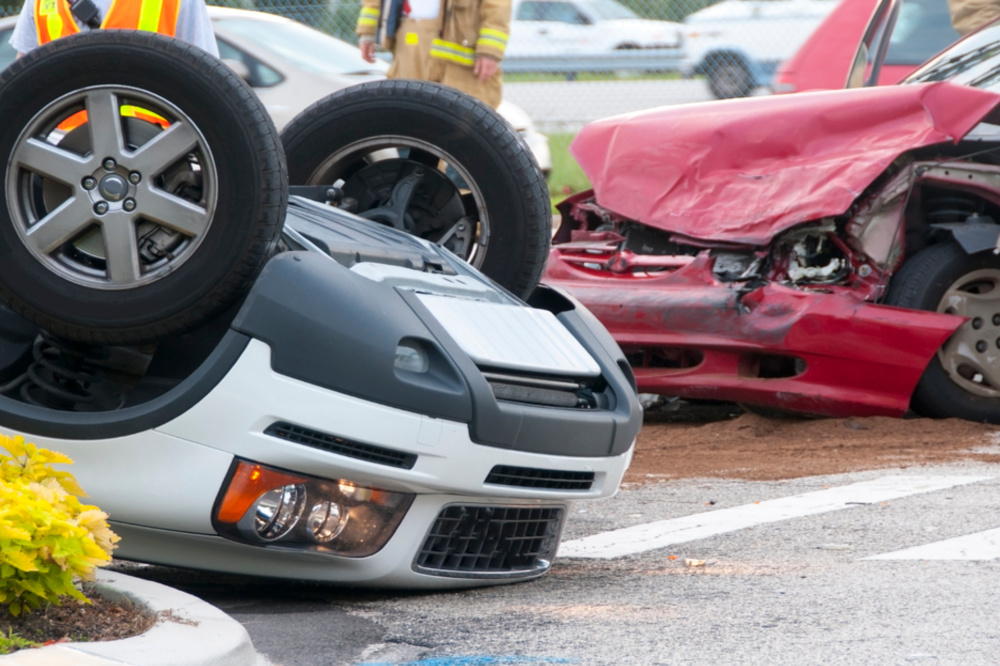Nobody wants to be in a car accident, but a rollover accident is a particular kind of catastrophe. No matter how firmly strapped in, occupants in the car are left at the very least discombobulated and panic-stricken, and at the worst, severely injured or dead.
There is a high probability of being ejected from the vehicle or of being trapped beneath a crushed roof. As the NHTSA reports, rollover accidents are relatively rare (2.1% of accidents in 2010), but they are also often fatal: nearly 35% of all auto accident fatalities were from rollovers.
Causes of Rollover Accidents
- Taller vehicles have a higher center of gravity, so are more likely to roll over in single-vehicle accidents. They are also more likely to be affected by wind gusts (although this is more of a problem for semi-trucks).
- Speed is a huge factor in rollover accidents, particularly as drivers try to negotiate turns while traveling quickly.
- Alcohol. Nearly half of all fatal rollover accidents involve alcohol.
- Rural areas. Rural roadways with no dividers and 55 mph speed limits are the locations for almost ¾ of fatal rollover accidents.
- Vehicle problems. Issues such as worn or separated tire treads, faulty suspension, failing brakes, defective steering can all cause rollover accidents.
- Tripping. NHTSA reports that 95% of single-vehicle rollover accidents occur when a vehicle hits a curb, guardrail, or soft dirt. The sideways lurch can cause the vehicle to leave the road, especially if the driver instinctively overcorrects and applies high “tripping” force to the tires.
- Another driver. If another driver crashes into you, especially at a high rate of speed, it may cause your car to tip and roll.
SUVs are safer from rollovers than they used to be because of increased safety measures (like Electronic Stability Control), but any vehicle with a high center of gravity can be prone to rollover accidents when hitting a road obstruction.
The vehicles with the worst rollover ratings from the National Highway Transportation Safety Administration are:
- Nissan NV3500
- Jeep Wrangler Unlimited 4WD
- Jeep Wrangler 4WD
- Toyota 4Runner 2WD
- Jeep Renegade 4WD
- Ford F250
- Ram 2500
Common injuries in rollover accidents:
Rollover accidents result in serious injuries. These are among the most common:
- Head injuries: As your vehicle rolls, you may make contact with the roof, the dashboard, and the side of the door. Also, any items that you are driving with can become projectiles. If you are ejected from your vehicle, your body will fly forward until it is stopped by the road or other surface. Traumatic brain injuries can be the result.
- Neck Injuries: Whiplash is common in all accidents. It happens when your head is violently snapped back and forth. This can damage muscles, tendons, and ligaments.
- Spine injuries: Rollovers can cause dislocated discs, spinal fractures, or spinal cord injuries.
- Upper body injuries: Passengers are at risk for collapsed lungs, broken ribs, and broken collarbones.
- Injured limbs: As your body is tossed around the vehicle, it is possible to break bones or even lose limbs.
- Damage to internal organs: The most common internal injuries in car accidents are damage to the kidneys, liver, or spleen, but any organ damaged in an accident can result in internal bleeding.
How can you protect yourself?
- First of all, always buckle up, and insist that all of your passengers do the same. If you are ejected from a vehicle, you have a five times greater chance of dying in the crash than otherwise.
- Drive a vehicle that is up to date with safety systems, especially electronic stability control (ESC) and side curtain airbags.
- Make sure that your tires are properly inflated and in good shape.
- Don’t overload your vehicle, especially the roof. Put heavier items on the floor.
- Watch your speed, especially as you take turns.
If you are in a rollover accident, you may need to sue the driver who caused it or (if your vehicle has faulty equipment), the manufacturer. You need time to recover without worrying about the details proving liability.
At Crossen Law Firm, we have decades of experience helping car crash victims get the compensation they deserve after they have suffered injuries at the hands of a negligent driver. Our Indianapolis car accident attorney is a dedicated advocate for seriously injured people. Our aim is to effectively and completely handle the legal process for you, as you focus on recovering from your injuries.
Keep in mind the fact that in Indiana, the statute of limitations is two years. Under Indiana Code section 34-11-2-4, you have two years from the date of your car accident to file a personal injury lawsuit against an at-fault driver.
Let Crossen Law Firm handle the fight for compensation. Get started on your case today by scheduling a free consultation about your situation. Call 317- 401-8626 or contact us online.

 317-401-8626
317-401-8626 
.jpg)